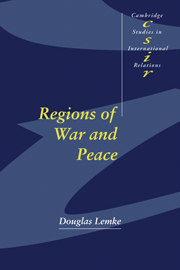Book contents
- Frontmatter
- Contents
- Acknowledgments
- 1 Introduction
- 2 Theoretical origins
- 3 Theoretical revision: the multiple hierarchy model
- 4 Identifying local hierarchies and measuring key variables
- 5 Empirical investigations
- 6 Further investigations I: great power interference?
- 7 Further investigations II: an African (interstate) Peace?
- 8 Conclusions, implications and directions for continued research
- Appendix: Replication with Correlates of War capabilities data
- References
- Index
- CAMBRIDGE STUDIES IN INTERNATIONAL RELATIONS
5 - Empirical investigations
Published online by Cambridge University Press: 22 September 2009
- Frontmatter
- Contents
- Acknowledgments
- 1 Introduction
- 2 Theoretical origins
- 3 Theoretical revision: the multiple hierarchy model
- 4 Identifying local hierarchies and measuring key variables
- 5 Empirical investigations
- 6 Further investigations I: great power interference?
- 7 Further investigations II: an African (interstate) Peace?
- 8 Conclusions, implications and directions for continued research
- Appendix: Replication with Correlates of War capabilities data
- References
- Index
- CAMBRIDGE STUDIES IN INTERNATIONAL RELATIONS
Summary
This chapter begins the presentation of tests of the multiple hierarchy model's main hypothesis. In general what I am testing is whether the multiple hierarchy model's expectation of power parity and dissatisfaction with the status quo making war more likely is true in minor power regions as well as among the great powers. Specifically, I evaluate the hypothesis that power parity and status quo dissatisfaction increase the probability of wars involving the dominant power in international power hierarchies, be they global or local. Doing so leads to additional empirical analyses.
Units of analysis and the dependent variable
In order to test my hypothesis, I study dyadic combinations within global and local power hierarchies. I analyze whether power parity and status quo dissatisfaction tend to be present when wars are fought, and whether they tend to be absent when peace prevails.
As mentioned in the previous paragraph, the analysis is of dyads, or pairs of states. Unlike most international conflict analyses, however, I do not study all dyads nor do I observe the dyads in my studies annually. My case selection procedure is thus somewhat different from standard analyses. It differs because my theoretical structure, the multiple hierarchy model, necessitates it.
Rather than observing all dyads annually, I observe dyads of the dominant power with each contender within its power hierarchy over decade-long intervals. The multiple hierarchy model hypothesizes that when a dissatisfied challenger achieves parity with the dominant power in its hierarchy, the probability of war within the hierarchy increases.
- Type
- Chapter
- Information
- Regions of War and Peace , pp. 112 - 145Publisher: Cambridge University PressPrint publication year: 2002



